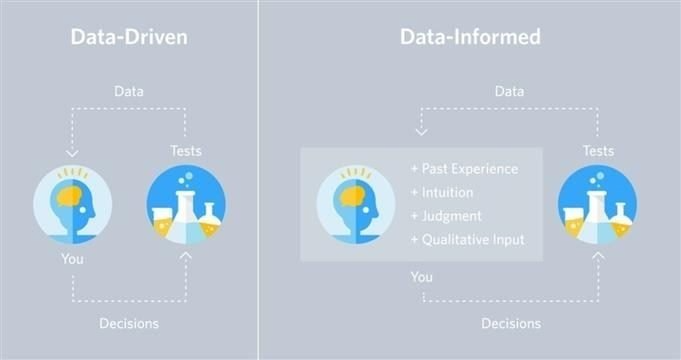Why You Should Be Data-Informed, Not Data-Driven
What’s the difference between data-informed and data-driven?This is a subtitle for your new post. This article will help you figure out why and how to incorporate a data-informed approach to product development.
Let's start by outlining the difference between Data-Driven and Data-Informed. In a nutshell, when you're data-driven, you're letting the data - and only data - guide your decision-making process.
In a data-informed process, other variables, such as your past experience, intuition, judgment and other qualitative outputs come into play to guide your decision-making process. Data is still part of the equation, but it's enhanced by some non-quantifiable measures.
When you let data, and only data, guide your decision-making process, you'll have to collect more of it in order to have the most accurate models and find scientific or mathematical trends. The problem is, data never gives you all the answers and never tells you exactly what to do next if you want to continue growing.
Companies often over-optimize small aspects and don't develop a broader product vision by relying exclusively on data to guide them. The risk of focusing exclusively on data is that you start to cherry-pick the data depending on what you believe and understand.

As an example, if you follow only your category management team recommendations to decide what your next product should be, you might end up in a short term loop, where your team won’t be able to build a sustainable incremental sales strategy, which is key to continue growing as a company.
You can be data-informed by using intuition and data together to generate testable hypotheses about your product.
5 advantages to be more data informed in your innovation approach:
The most digitally mature organizations embrace data and use it to make better, faster decisions. Even though data is highly important, what ultimately sets the roadmap of decision-making is judgment and critical thinking.
Here are the main advantages to using a data-informed decision-making process in your company:
#1 - Talk and listen with your experts
Your product experts can easily add that qualitative aspect to orient the data research. The qualitative supports the quantitative, and vice versa. If all the great ideas for new products could be found just by cross-referencing data, you wouldn't need product experts on your teams. Instead, you would work with Data scientists, BI, etc.
Your product experts can therefore bring great added value by leaving room for a critical eye and intuition to build your innovation portfolio.
#2 - Test, test, test!
It's no secret that understanding your customers is key to your growth. After all, that's why many large companies have extensive marketing research departments who spend a lot of time analyzing customer behaviours, sales patterns and trying to project where the market will go.
Testing a product with consumers before launching it will enable you to see if your intuition is on the right track. Adding some qualitative insights and your own gut feeling and hunches, then backing it up with actual factual data is the way to go.
#3 - Focus on the solution
When you start the innovation process with intuition, instead of raw data, it allows you to focus on promising projects, instead of getting stuck at a strategic level and looking for action plans that will lead to a real product.
Using tests and the data it reveals, along with your category management input will allow you to move forward instead of remaining theoretical about potential white spaces.
#4 - Better predictions for the outcomes of new product performance
If you're able to collect data in real time, you'll be able to make adjustments along the product development process, and maximize the chances of success of your new products. Historical data about previous launch challenges may also allow you to determine ahead of time the challenges your new product may face in order to avoid them.
#5 - Transform data into valuable information
Give the data you collected a voice: turn it into a graph, an image or a story before sharing it with the various departments. Don’t forget to share the key messages, so that the information guides the interpretation of the data, which allows you to accelerate the conversation.
Tips for a smooth transition
Have you ever prepared for a meeting, had the facts and figures ready to go, and in the end, the decision went in the opposite direction? It probably felt like the decision had been made before the meeting even began. If this sounds familiar, you are not alone.
As seen in a recent publication by BI-Survey, 58% of the companies they surveyed said that they base at least half of their business decisions on intuition and experience instead of analytical methods.
If you're able to convey a mix of solid and sound data, coupled with some qualitative insights into a presentation that addresses the main objectives of the decision maker, you'll be able to contribute real insights and have a conversation (and probably an outcome) that is data-informed.
By harnessing data in the right way and measuring your success, you are sure to propel your business to new heights.
Feel free to
schedule a call with us if you want to find out how to harness data to improve your decision-making process!
_________________________________________________________
Innovation MB is an Innovation Management Agency with a passionate team of professionals who will help accelerate your innovation journey to hit the market faster successfully.
Your Innovation Management Ecosystem is your path to success. Book a discovery call with one of your experts to find out how to take your Innovation Journey to the next level!
Product innovation Bog




